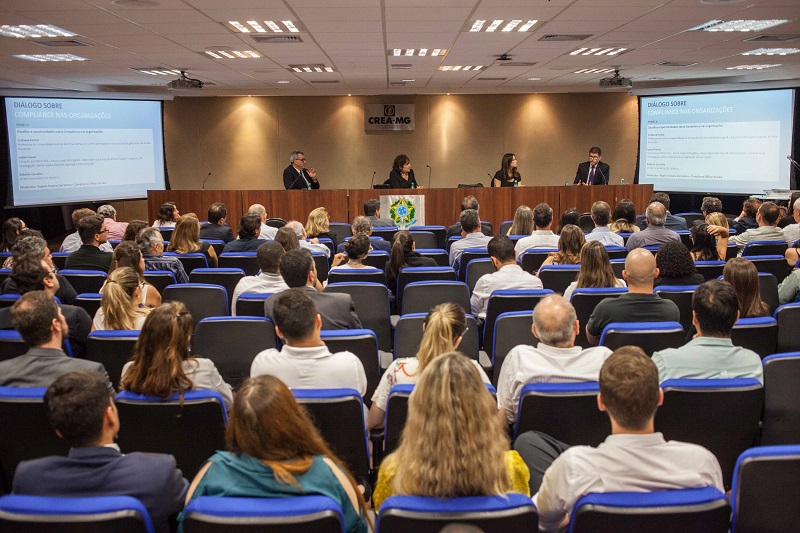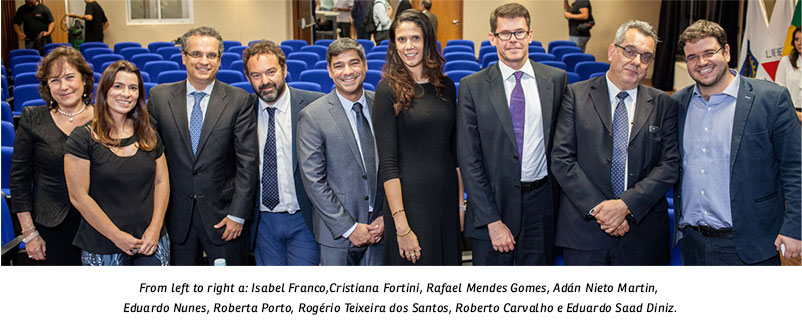07/03/2018

In order to stimulate the debate concerning the challenges of creating its compliance programs, Samarco held the event “Dialogue about compliance in organizations,” yesterday in conjunction with the Center of Research and Education about Compliance (CPEC). The event brought together specialists on the topic and gave them the opportunity to debate European trends and their repercussions in Brazil, as well as topics such as due diligence of third parties, privacy and risk integration and the challenges and opportunities of compliance in organizations.
Samarco’s CEO, Roberto Carvalho, participated in one of the panels and highlighted that the company began its Compliance Program in 2002 and that the culture of integrity has already been disseminated among employees. “I assumed the position of CEO of the company right after the Fundão Dam break and I can affirm that the level of employee exposure (to the programs) was very high. We intensified interactions with different publics, especially in the emergency phase, and we haven’t had a single registry of a corruption-related misconduct,” he stated.
On the same panel, professor at the Federal University of Minas Gerais, Cristiana Fortini, affirmed that a culture of compliance should be constructed and not imposed. According to Fortini, “Compliance should serve as an option to propel companies into the future. Integrity is something that influences people’s behavior and is important to promote the creation of these cultural traits.”
Specialist in anti-corruption legislation, Isabel Franco, commented that she has noticed great progress in Brazil in the last four years. “Compliance programs in Brazil follow standards that are becoming more and more international. Collaborators should participate in the creation of a program from the beginning and it must be the face of every company.”
In the opinion of the director of the Center of Research and Education about Compliance (CPEC), Rafael Mendes Gomes, the adoption of an integrity program for a company is a one-way trip. “After initiating a compliance program, an employee can point out what’s wrong. The objective of these programs is to prevent, detect and fix misconduct,” he said.
Trends
Professor of Criminal Law at Castilla La Mancha University (UCLM), a European reference in compliance, Adán Nieto Martin, was one of debaters of the panel “European trends in compliance and their repercussions in Brazil: due diligence of third parties, privacy and risk integration.” According to him, “In Spain, it is expected that risk analysis should be done for all company activities.”
Meanwhile, professor at the University of São Paulo (USP) of Ribeirão Preto, Eduardo Saad Diniz, touched on the importance of due diligence, but affirmed that “controls cannot become obsessive.”
The debate took place at the headquarters of the Regional Council of Engineering and Agronomy (Crea-MG), where Compliance Officers Eduardo Nunes (BHP) and Rogério Teixeira dos Santos (Vale) acted as moderators of the panels.iligence of third parties, privacy and risk integration.” According to him, “In Spain, it is expected that risk analysis should be done for all company activities.”

Transparency International Brazil
Samarco appeared on the list of a study by the organization Transparency International Brazil. The company placed 31st in transparency among the 100 largest Brazilian companies. The study, carried out in 2017 and published this year, sought to identify how the country’s largest corporations are evolving in the standards of transparency and anti-corruption.
To learn more about the study click here.